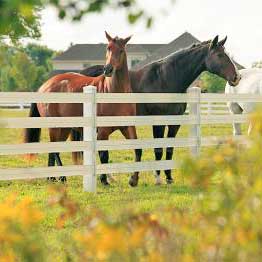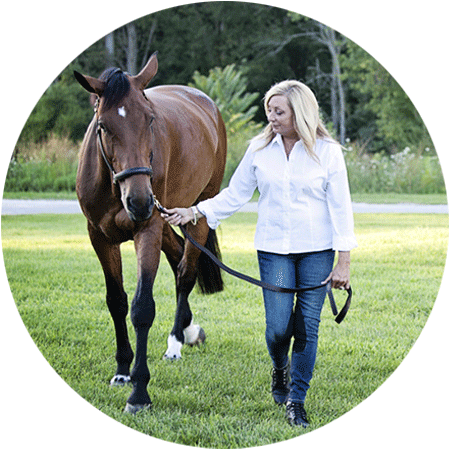4 Ways to Get Ready for Spring

In Ohio, we have our fair share of snow every year! I know that spring will be here soon because the birds have started to sing their full songs and my chickens have started to lay again! The snow comes and the sun melts it into the lifeless looking grass. Soon all of those puddles of mud and pastures will be turning lush and green. That’s when I know its high time to get busy and evaluate pastures, fence lines, gates, water areas and out-door sheds.
So what can you do to prepare for the Spring season? Below are four ways to help you get your horse property ready for the spring!
1. Walk or Ride Your Fence Lines
After seeing many accidents that could have been avoided, this takes the number one slot of things to check on before spring weather approaches. Our horses spend most of their time in their pastures. It is there natural home, and I feel that too many of us forget this. We can spend our money on all the latest gadgets for our horses, the newest boots and accessories, but without safe fencing we hurt our best and largest investment - our horses and their well-being
Ride or walk you fence lines and look for any protruding nails, screws, or loose brackets. If you have wood fencing, be very sure all rails meet end to end and that they do not warp outward. Boards that do not line up flat can potentially injure and cut your horse. If you have PVC, be sure that all rails are fully in the post routings and that your secondary electric fencing is working to full capacity.
Take a notebook along as you walk your lines and jot down notes of what material you may need to do any repairs. Also take a versatile pair or fence pliers and ring shank nails for quick repairs, if needed. Tie bright plastic tape at repair spots. This will help to save time when you return to do repairs. If you see any high traffic areas where your horses are starting to push or lean on your fence, (maybe they found the grass is good on the other side, or a tree that has grown large enough to reach the leaves,) take measures to stop the abuse to your fence. Consider cutting brush and trees far enough away from a leaning horse and also adding more rails to that stretch of fence, Raceline Flex Fence® coated wire, or Pro-Tek Braid.
2. Check Your Gates
Winter weather has a relentless way of "moving" some of our most leveled gates! Frost and thaw naturally creates damp and frozen ground that "moves" as the weather changes. It is just a fact of nature. After some amount of time or wear, gates must be re-leveled and checked to be sure that spaces between gate or latch post is no more that 3 inches. Larger spacing could be potentially dangerous places for ponies and horses. Unfortunate problems occur when a horse pushes their heads or legs through the space between the latch post and gate. When the horse pulls back, the gate pulls back too catching the horse without a way out. Unfortunate accidents can be avoided by checking your gate areas to make sure your posts are set straight and checking for safe latch spacing.
If your walkways to and from your gates are worn and tracked down from use, consider using stone screenings on walk areas.
3. Check Watering Areas
Water is one of the most important things that you horse consumes. And especially after the winter thaw, it is good to do a close evaluation of you watering areas. If you have metal water troughs, check for rusted and/or dented areas that can lead to slow leaks or loss of water for your horses. Also look over plastic tubs for cracking. Automatic waters should be checked frequently for proper filling. All water containers should be cleaned, bleached and rinsed thoroughly on a regular basis. If your horses like to play in your water troughs, consider using fine stone screenings under and around your watering area. This will help to eliminate standing water, puddles and bug activity. The additional use of stall mats in a water area can help helps to eliminate frequent maintenance around your waterers.
4. Outdoor Sheds
If you hoses are out side all or most of the time, its important to their health to have an area where they can get out of inclement weather, wind, snow and sun. A 3-sided shed provides a place for horses to get relief form the weather. Be sure to check sheds for any areas of abuse. Split wood, broken pipe, or broken siding can be areas waiting for an accident to occur. Make repairs and you will be saving your horse from injury, not to mention a costly vet bill. If your horses have "nested" and made large impressions in the ground, refill in those areas with dirt and consider using some sawdust or straw in nap areas. It will be more comfortable inside the shed for your horse, and will help to avoid spaces under the frame of the shed. Be sure, especially in windy areas, that you anchor your shed and that the back of it faces the prevailing wind direction.
Get you repairs done early in the year and you’ll be ready for the beautiful riding weather to come. Make your horses living areas the safest that you can! Be ready for spring. It’s just around the corner!

#LaughMuchRideOften
Debbie has over 45 years experience with horses and equine-related businesses. She has owned, trained, boarded horses and run stables at various times in her career. She is a certified fence installer, has given balanced riding lessons, and has shown horses in Western, Western Pleasure, Trail, English, Hunter/Jumper, Fox Hunting, Hunter Trials, Dressage and driving classes. Debbie has been involved in foaling, and just about every aspect of horse ownership possible, and she welcomes your questions and comments. If you are interested in using any articles by Debbie, please send her an email.
RAMM Fence Systems, Inc. makes every effort to provide reliable and useful information on horse health, care and products. The statements made on this website are based on years of experience with horses, however, they are based on generalized situations and should not replace diagnosis or treatment by a veterinarian or consultation by a professional. RAMM Fence Systems, Inc. does not assume any legal responsibility. Readers should always consult qualified health care providers for specific diagnosis and treatment.
- See more at: http://www.rammfence.com/resource-center/ramm-articles/hold-your-horses#sthash.nd5JN3sF.dpuf
Debbie has over 45 years experience with horses and equine-related businesses. She has owned, trained, boarded horses and run stables at various times in her career. She is a certified fence installer, has given balanced riding lessons, and has shown horses in Western, Western Pleasure, Trail, English, Hunter/Jumper, Fox Hunting, Hunter Trials, Dressage and driving classes. Debbie has been involved in foaling, and just about every aspect of horse ownership possible, and she welcomes your questions and comments. If you are interested in using any articles by Debbie, please send her an email.
RAMM Fence Systems, Inc. makes every effort to provide reliable and useful information on horse health, care and products. The statements made on this website are based on years of experience with horses, however, they are based on generalized situations and should not replace diagnosis or treatment by a veterinarian or consultation by a professional. RAMM Fence Systems, Inc. does not assume any legal responsibility. Readers should always consult qualified health care providers for specific diagnosis and treatment.
- See more at: http://www.rammfence.com/resource-center/ramm-articles/hold-your-horses#sthash.TZgqbF8F.dpufDebbie has over 45 years experience with horses and equine-related businesses. She has owned, trained, boarded horses and run stables at various times in her career. She is a certified fence installer, has given balanced riding lessons, and has shown horses in Western, Western Pleasure, Trail, English, Hunter/Jumper, Fox Hunting, Hunter Trials, Dressage and driving classes. Debbie has been involved in foaling, and just about every aspect of horse ownership possible, and she welcomes your questions and comments. If you are interested in using any articles by Debbie, please send her an email.
RAMM Fence Systems, Inc. makes every effort to provide reliable and useful information on horse health, care and products. The statements made on this website are based on years of experience with horses, however, they are based on generalized situations and should not replace diagnosis or treatment by a veterinarian or consultation by a professional. RAMM Fence Systems, Inc. does not assume any legal responsibility. Readers should always consult qualified health care providers for specific diagnosis and treatment.
- See more at: http://www.rammfence.com/resource-center/ramm-articles/hold-your-horses#sthash.nd5JN3sF.dpufDebbie has over 45 years experience with horses and equine-related businesses. She has owned, trained, boarded horses and run stables at various times in her career. She is a certified fence installer, has given balanced riding lessons, and has shown horses in Western, Western Pleasure, Trail, English, Hunter/Jumper, Fox Hunting, Hunter Trials, Dressage and driving classes. Debbie has been involved in foaling, and just about every aspect of horse ownership possible, and she welcomes your questions and comments. If you are interested in using any articles by Debbie, please send her an email.
